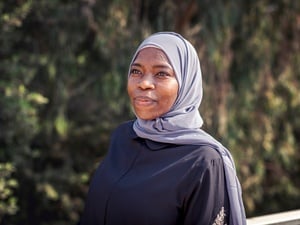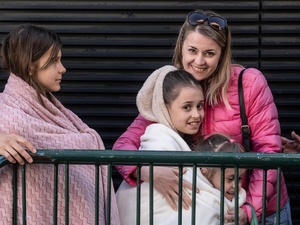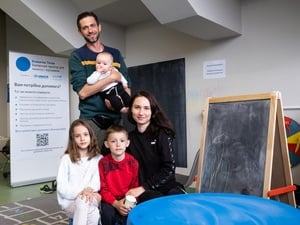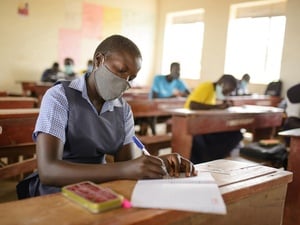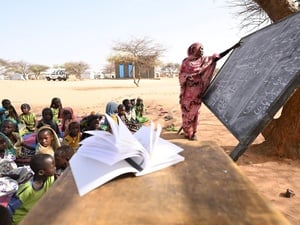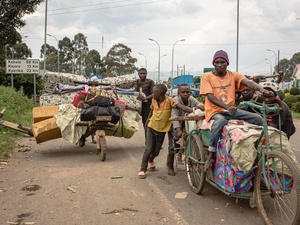UNHCR deputy chief urges Iraqi refugees to send children to school
UNHCR deputy chief urges Iraqi refugees to send children to school

UN Deputy High Commissioner for Refugees L. Craig Johnstone talks to the media about Iraqi refugees at the the refugee registration centre in Damascus.
DAMASCUS, Syria, July 19 (UNHCR) - Deputy High Commissioner for Refugees L. Craig Johnstone on Thursday urged Iraqi refugees in Syria to enrol their children in public schools as he continued his first visit to the Middle East for UNHCR.
"The Syrian government allows your children to register in public schools. Make the most of this opportunity; send your children to school," Johnstone told a gathering of more than 400 Iraqi refugees at the UNHCR Registration Centre in Damascus.
"The education of your children will secure the future of Iraq and the future of your families. Spread the word - we want all Iraqi families in Syria to know that they have the right to send their children to school," added Johnstone, who arrived here Wednesday evening from Jordan on the second leg of his first visit to the region since joining UNHCR in June.
Johnstone's visit to main host countries Syria and Jordan has given him a chance to see for himself the humanitarian situation for more than 2 million Iraqi refugees and to show support for the two countries. He met several Iraqi families on Thursday and heard their tales of suffering.
The visit also coincides with the launch of a joint campaign by the UN refugee agency and the UN Children's Fund (UNICEF) to increase the number of Iraqi children in schools in Syria from the current 33,000 to 100,000 by the end of the 2007-08 school year.
An appeal last week for extra funds for UNHCR's Iraq-linked programmes noted that most Iraqi children were not attending school and said that outside Iraq, the agency would focus on five areas of assistance for Iraqi refugees - education, health, food, social and legal counselling and shelter. A recent survey in Damascus indicated that a significant number of children were not yet enrolled in school.
At Thursday's meeting with refugees waiting to register, Johnstone also extended his sympathy to those gathered and reiterated the agency's gratitude to the Syrian government for offering refuge to the estimated 1.4 million Iraqi refugees living in Syria. He took the opportunity to highlight the services available to refugees, especially health and education.
The UN refugee agency has been appealing for increased international support for the governments of both Syria and Jordan as they struggle to cope with the influx of refugees. In last week's appeal, UNHCR issued a revised budget of US$123 million for its programmes, up from US$60 million in January.
"UNHCR has already registered more than 150,000 Iraqis in the region and many of them have special needs, including help in getting their children in school and serious medical problems. The needs are enormous and these governments should not have to cope alone," said Johnstone.
He talked to several families about their flight from Iraq and the struggle to make ends meet in Syria. Among those the Deputy High Commissioner met were a young family who needed urgent medical care for the father, a woman who has been separated from her children in Iraq and a family that is waiting for news of relatives who were abducted in Iraq.
Their cases were typical. During the past six months, more than one in five refugees interviewed by UNHCR in Syria has been registered as a victim of torture, and one in six has a serious medical condition.
Johnstone also spent time in the UNICEF child-friendly space at the registration centre, where Syrian Arab Red Crescent volunteers were providing entertainment for the children as they waited for their appointment.
The Deputy High Commissioner has held positive meetings with senior government officials in both Syria and Jordan, where he kicked off his visit earlier this week. He has met top government officials and senior representatives of UNHCR implementing partners in both countries.
Meanwhile, the displacement of Iraqis in the face of extreme violence continues unabated, with a significant impact on the surrounding region. To date, over 4 million Iraqis have been uprooted. The more than 2 million refugees in surrounding countries include some who fled their country during the pre-2003 regime of Saddam Hussein. The outflow has escalated in the past eighteen months.
More than 2 million Iraqis are displaced internally. Some 1 million Iraqis are estimated to have fled their homes since the bombing of an important Shiite Muslim mosque in the central city of Samarra in February 2006. The displacement continues at a rate of about 100,000 a month.
By Sybella Wilkes in Damascus, Syria


